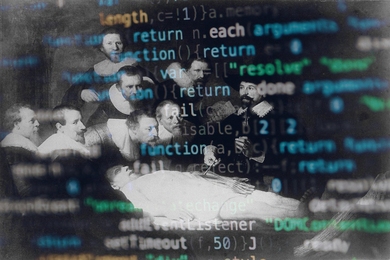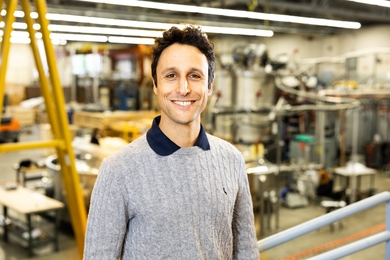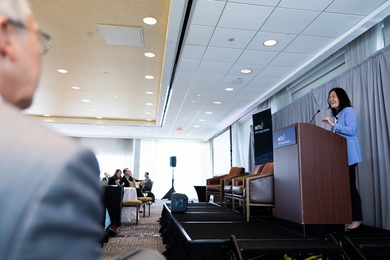The United States has its first black president, in Barack Obama. Yet for all the progress Obama’s election represents in racial terms, the great political challenge for blacks in America remains intact, according to a panel of scholars who spoke at MIT on Thursday: finding a way to implement policies that provide new opportunities for a larger portion of African-Americans.
“It’s key for African-Americans and other marginalized groups not to think that you just vote, go home and wait for good things to happen,” said J. Phillip Thompson, an associate professor in MIT’s Department of Urban Studies and Planning.
That problem applies to all levels of government, and to city-level politics in particular, Thompson added, saying, “work has to be done to figure out what to do with the office, with the resources that are there. … We have not tackled that. We have continued to elect mayors with absolutely no agenda.”
With unemployment for blacks around 15 percent, the effects of the economic problems of recent years were at the forefront of Thursday’s discussion, “The Future of Black Politics.” The forum was part of the “Ideas Matter” series of events, jointly sponsored by MIT’s Department of Political Science and the Boston Review, which is housed at MIT.
Michael Dawson, the John D. MacArthur Professor of Political Science at the University of Chicago, said that black politicians and activists have “all too frequently abandoned the struggle for economic justice.” As one measure of that, Dawson noted, African-Americans were notably “divorced from the struggle for economic equality represented by the Occupy movement,” referring to the protests that grabbed headlines last fall.
Participation problems
The economic struggles of the middle and working classes were just one place where panelists saw the interests of America’s blacks converging with those of other ethnic groups. Thompson suggested that blacks should see other ethnic groups as natural allies in the ongoing effort to preserve voting access at a time when many states have enacted voting-booth restrictions.
“There is a huge disenfranchisement going on, due to our voting laws,” Thompson said. “And I think to fight that we have to build a conversation with Latino leaders, because we’re both being disenfranchised.” Thompson’s students, he noted, have found in studies that in Los Angeles, Miami and New York, “at least 30 percent of the taxpaying adult voting-age population can’t vote because of immigrant status. If you add in ex-felons who can’t vote … you’re at nearly 50 percent of the [urban] population.”
While race has been a less conspicuous part of this year’s election campaign than it was in 2008, questions relating to voting access and eligibility for other state provisions have been a leading topic of discussion among black scholars recently. As The New York Times noted this week, law professor Michelle Alexander’s book The New Jim Crow, which chronicles the effects of the high imprisonment rate among blacks, has sold nearly 200,000 copies in the last two months and reached best-seller status.
The prevalence of those issues, suggested Melissa Nobles, the Arthur and Ruth Sloan Professor of Political Science at MIT, means that if black participation in politics “still isn’t secure,” then “there’s a certain tension about where to put one’s energies” among black activists, which may leave economic issues lower on the agenda.
A search for ‘accountability’
Still, the main focus of the discussion on Thursday was the struggle blacks are facing to get politicians to follow through on specific measures that could help much of the black community.
Too often, said Andra Gillespie, a political scientist at Emory University who is currently an MLK Visiting Associate Professor at MIT, younger black mayors and other politicians have been very “trusting” and, in a bid to appeal to the largest constituencies possible, have “allied themselves with forces that have no intention of actually improving the lives of communities of color.”
Gillespie added, “The concern that I have is accountability.”
Ultimately, she noted, this comes from the voting booth, citing the case of Artur Davis, a black congressman from Alabama who ran for governor there in 2010. Despite the economic interests of his constituents, Davis became one of the few Democrats to vote against the health-care reform bill that Congress passed in March 2010, in what Gillespie characterized as a calculated “attempt to appeal to white voters.” A few months later, Davis lost the Democratic gubernatorial primary.
The lesson, Gillespie said, is that “African-American voters are sophisticated and realize that just because someone shares their racial and ethnic identity doesn’t necessarily mean that they act in our interest.”
One audience member challenged the panelists on the value of thinking of blacks as one community rather than a series of smaller groups whose apparent fracture could also be interpreted as a healthy sign of inclusion into the larger American fabric.
In response, Thompson noted that maintaining a sense of black community mattered both because blacks had only recently acquired basic rights in America, but also because, as many black intellectuals have claimed, that struggle has been part of a global struggle for human rights.
“I want to use and revive the tradition of black community, not for purposes of keeping it small and narrow, but reminding people how we’ve always viewed our situation in America,” Thompson said. “We couldn’t even vote in America until I was in junior high school.” Those advances embody a higher sense of shared purpose, he added: “We see ourselves as part of something bigger.”
“It’s key for African-Americans and other marginalized groups not to think that you just vote, go home and wait for good things to happen,” said J. Phillip Thompson, an associate professor in MIT’s Department of Urban Studies and Planning.
That problem applies to all levels of government, and to city-level politics in particular, Thompson added, saying, “work has to be done to figure out what to do with the office, with the resources that are there. … We have not tackled that. We have continued to elect mayors with absolutely no agenda.”
With unemployment for blacks around 15 percent, the effects of the economic problems of recent years were at the forefront of Thursday’s discussion, “The Future of Black Politics.” The forum was part of the “Ideas Matter” series of events, jointly sponsored by MIT’s Department of Political Science and the Boston Review, which is housed at MIT.
Michael Dawson, the John D. MacArthur Professor of Political Science at the University of Chicago, said that black politicians and activists have “all too frequently abandoned the struggle for economic justice.” As one measure of that, Dawson noted, African-Americans were notably “divorced from the struggle for economic equality represented by the Occupy movement,” referring to the protests that grabbed headlines last fall.
Participation problems
The economic struggles of the middle and working classes were just one place where panelists saw the interests of America’s blacks converging with those of other ethnic groups. Thompson suggested that blacks should see other ethnic groups as natural allies in the ongoing effort to preserve voting access at a time when many states have enacted voting-booth restrictions.
“There is a huge disenfranchisement going on, due to our voting laws,” Thompson said. “And I think to fight that we have to build a conversation with Latino leaders, because we’re both being disenfranchised.” Thompson’s students, he noted, have found in studies that in Los Angeles, Miami and New York, “at least 30 percent of the taxpaying adult voting-age population can’t vote because of immigrant status. If you add in ex-felons who can’t vote … you’re at nearly 50 percent of the [urban] population.”
While race has been a less conspicuous part of this year’s election campaign than it was in 2008, questions relating to voting access and eligibility for other state provisions have been a leading topic of discussion among black scholars recently. As The New York Times noted this week, law professor Michelle Alexander’s book The New Jim Crow, which chronicles the effects of the high imprisonment rate among blacks, has sold nearly 200,000 copies in the last two months and reached best-seller status.
The prevalence of those issues, suggested Melissa Nobles, the Arthur and Ruth Sloan Professor of Political Science at MIT, means that if black participation in politics “still isn’t secure,” then “there’s a certain tension about where to put one’s energies” among black activists, which may leave economic issues lower on the agenda.
A search for ‘accountability’
Still, the main focus of the discussion on Thursday was the struggle blacks are facing to get politicians to follow through on specific measures that could help much of the black community.
Too often, said Andra Gillespie, a political scientist at Emory University who is currently an MLK Visiting Associate Professor at MIT, younger black mayors and other politicians have been very “trusting” and, in a bid to appeal to the largest constituencies possible, have “allied themselves with forces that have no intention of actually improving the lives of communities of color.”
Gillespie added, “The concern that I have is accountability.”
Ultimately, she noted, this comes from the voting booth, citing the case of Artur Davis, a black congressman from Alabama who ran for governor there in 2010. Despite the economic interests of his constituents, Davis became one of the few Democrats to vote against the health-care reform bill that Congress passed in March 2010, in what Gillespie characterized as a calculated “attempt to appeal to white voters.” A few months later, Davis lost the Democratic gubernatorial primary.
The lesson, Gillespie said, is that “African-American voters are sophisticated and realize that just because someone shares their racial and ethnic identity doesn’t necessarily mean that they act in our interest.”
One audience member challenged the panelists on the value of thinking of blacks as one community rather than a series of smaller groups whose apparent fracture could also be interpreted as a healthy sign of inclusion into the larger American fabric.
In response, Thompson noted that maintaining a sense of black community mattered both because blacks had only recently acquired basic rights in America, but also because, as many black intellectuals have claimed, that struggle has been part of a global struggle for human rights.
“I want to use and revive the tradition of black community, not for purposes of keeping it small and narrow, but reminding people how we’ve always viewed our situation in America,” Thompson said. “We couldn’t even vote in America until I was in junior high school.” Those advances embody a higher sense of shared purpose, he added: “We see ourselves as part of something bigger.”





